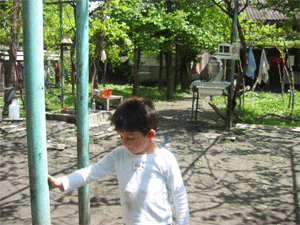Human Rights in an Azeri Way

Discrimination in Belaqani District Continues
Ititala- it is the village in Beleqani region, where confession of Georgian ethnicity and especially Christianity can result in problems. Two years ago our website revealed the story of the Iashvili family, who were persecuted by Azeri law enforcement authorities (see http://www.humanrights.ge/eng/stat53.shtml ). Temur Iashvili interested and greatly involved in addressing the discrimination problems in Georgia has been assaulted by the Azeri Police many times; even today he is persecuted and can’t visit his own village. Lately our attention has been drawn to this nice village and problems faced by the Georgian population living there. 15 year old Turane Balaeva (or Ana Baliashvili as she calls herself) has been physically abused by the school Director due to her Georgian “clothes and looks”.
After missing two days of school, Ana Baliashvili returned there on May 26th of this year - where she faced an assault from the Director. “The first lesson was math. The Director entered the room and asked who was absent that day and I responded because I am a prefect. This was followed by another question; who was absent the previous day? Myself and those others who were absent responded by standing up. Suddenly he approached me and hit me in the face. I ran away, he followed me calling me ‘swine’. He kept following me until he figured out that it was impossible to catch me. When I looked back I was overwhelmed by fear; his mad face revealed his readiness to kill me.”
The Azeri Director of the Georgian School Elba Abasov checked Ana’s attendance for the previous day and learning about her missing the lessons, he did not abstain from saying the offensive words towards her parents.
The question, why she was persecuted by the director, was answered by Anna as follows and she committed to us to make conclusion: “On previous days he entered the classroom, pointed to my jeans and asked, why I was dressed in Georgian way, though the others were also wearing the same"
A wooden cross worn by Ana under her clothes has not yet been noticed by the Director or the other teachers. “I keep my cross under my clothes; if they notice it they will assault me or even dismiss me.
Ana has not gone to school since May 26th. On June 4th the Balaevs appealed to the police against the director but as a result of permanent pressure from the Director’s relatives they were forced to halt their case.
It should also be noted that Ana’s sister is a Christian. Iza Blaeva believes that this alone provides an accurate explanation of the aggression expressed towards her. This is underlined by the fact that nobody can freely confess Georgian ethnicity and/or accept Christianity in the village. “If I say that I am Georgian or Christian I will be laughed at and even attacked” - Anna shares her sorrow with us.
“Here accepting Christianity represents a real issue… we are told to be Ingiloys and not Georgians, but this is nonsense since such a nation does not exist. It is the same as telling a person from Guria that he is not Georgian, but Gurian”, states Anzor Katsiashvili, who managed to regain his Georgian surname (he succeeded it several years ago in Georgia) and has consequently faced immense problems. His problems can also be attributed to his acceptance of Christianity, which has made him subject to pressure and persecution many times.
Giving surnames and even the first names to children in the Belaqauri district is a big problem that is proved by the story of Ramaz Mazanashvili, born in December 2001. He managed to receive his birth card in January this year.
“Ramaz was born 5 years ago and only received his birth card this year. I was not allowed to receive the card because in their opinion the child had a Georgain name”, says Ramaz’s mother Neli Mazanashvili and adds: “There were many cases of similar unresolved problems related to giving a name to a new-born. For example, our neighbor was permitted to have a name like Manana - for there is a singer in Azerbaijan with this name. However, she had to give a bribe. The thing is that the people living in Georgia, in Tatar villages, give names according to their will. The problem persists here; by using these tactics they want to prevent Georgians returning to their country”.
There are 5 families in Aliabadi (the village in Belaqan) with their previous Georgian surnames. They managed to get their family names back during the Soviet era, but not today, in Azerbaijan. “Nowadays it is impossible to get your own surname back… and as you can observe, here, those people with Georgian surnames are not able to get a job. To avoid creating additional problems, people even have changed the Georgian names of their children into Tatar. Many of the Georgians want to acquire citizenship in Georgia but they do not dare. You can find only a very limited number of families who are entirely devoted to their nationality and simultaneously are trying not to loose their origins – being Georgian”, says Neli Mazanashvili.
Mazanashvili calls on the Georgian government to take into consideration the issues concerning the Georgian ‘Ingiloys’: “We want to express our dissatisfaction towards the Georgian government being indifferent. We would like to demand support from Georgia”.



